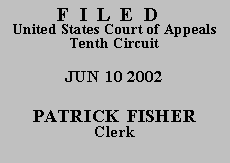

| JOE RAY MATTHEWS,
v.
RANDY WORKMAN, Warden;
ATTORNEY GENERAL OF THE
STATE OF OKLAHOMA |
|
Mr. Matthews pled guilty in Oklahoma state court to charges of possession of a controlled dangerous substance and drug paraphernalia. The court accepted the plea and Mr. Matthews was convicted. Mr. Matthews did not appeal, but did file two applications for state post-conviction relief.
Mr. Matthews filed a federal petition for habeas corpus, which was referred to a magistrate judge, who recommended that the petition be dismissed as time-barred under the one-year limitation provision of the Antiterrorism and Effective Death Penalty Act of 1996 ("AEDPA"), 28 U.S.C. § 2244(d). The federal district court adopted the magistrate's recommendation and dismissed the petition.
The AEDPA applies a one-year limitation period from the date of final conviction. 28 U.S.C. § 2244(d). Because he did not choose to appeal, Mr. Matthews' conviction became final on October 28, 1996, ten days after entry of judgment and sentence. See Fisher v. Gibson, 262 F.3d 1135, 1138 & 1142 (10th Cir. 2001). Mr. Mathews' statute of limitation period therefore expired on October 27, 1997.
AEDPA's time limitation is tolled during while a properly-filed application for state post-conviction relief is pending. 28 U.S.C. § 2244(d)(2). Mr. Matthews filed two motions for post-conviction relief in Oklahoma state court. However, the first was filed on February 28, 2001, long after the statute of limitations had expired.
The AEDPA's one-year period of limitation is subject to equitable tolling in extraordinary circumstances. Miller v. Marr, 141 F.3d 976, 978 (10th Cir. 1998). In this case, we find no "circumstances where the limitation period at least raises serious constitutional questions and possibly renders the habeas remedy inadequate and ineffective." Id. at 978. We find, as did the district court, that nothing alleged by Mr. Matthews amounts to an extraordinary circumstance that warrants equitable tolling.
Mr. Matthews' habeas petition was untimely.
We DENY a COA and DISMISS the appeal.
Entered for the Court
Paul J. Kelly, Jr.
Circuit Judge
*. This order and judgment is not binding precedent, except under the doctrines of law of the case, res judicata, and collateral estoppel. This court generally disfavors the citation of orders and judgments; nevertheless, an order and judgment may be cited under the terms and conditions of 10th Cir. R. 36.3.
**. After examining the briefs and the appellate record, this three-judge panel has determined unanimously that oral argument would not be of material assistance in the determination of this appeal. See Fed. R. App. P. 34(a); 10th Cir. R. 34.1(G). The cause is therefore ordered submitted without oral argument.